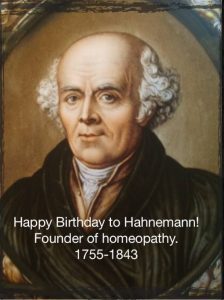Father of Homeopathy
Homeopathy is based on the principle that ‘like cures like’ – in other words, a substance taken in small amounts will cure the same symptoms it causes if it was taken in large amounts. This idea dates back to Hippocrates (460-377BC), who also thought that symptoms specific to an individual should be taken into account before making a diagnosis. This is also an important principle of homeopathy, where an individual’s unique symptoms are important in distinguishing the correct medicine. The idea of like curing like was not to re-emerge in any great way until a German physician, Dr. Samuel Hahnemann (1755-1843) came to devise the system of medicine that we know as homeopathy.
 Dr. Samuel Hahnemann in the early 19th century founded homeopathy upon the principle “like cures like”, homeopathy works to promote optimal health for the entire individual on all levels: physically, mentally and emotionally. Homeopathy is essentially an energy medicine. Based on the premise that all disease is the result of some derangement, or weakness of our vital force which by its very existence is energy itself and not substance. Therefore, the only way to bring about a true and lasting cure for our maladies is to introduce a remedy into our organism, which exists on the identical plane and contains those same properties as that vital force which has become compromised.
Dr. Samuel Hahnemann in the early 19th century founded homeopathy upon the principle “like cures like”, homeopathy works to promote optimal health for the entire individual on all levels: physically, mentally and emotionally. Homeopathy is essentially an energy medicine. Based on the premise that all disease is the result of some derangement, or weakness of our vital force which by its very existence is energy itself and not substance. Therefore, the only way to bring about a true and lasting cure for our maladies is to introduce a remedy into our organism, which exists on the identical plane and contains those same properties as that vital force which has become compromised.
